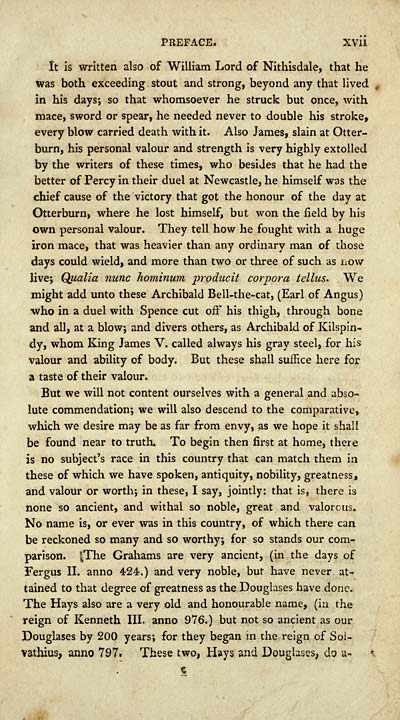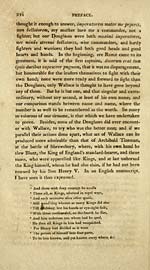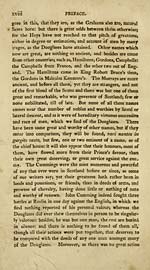History of the house and race of Douglas and Angus
(21) Page xvii
Download files
Complete book:
Individual page:
Thumbnail gallery: Grid view | List view

PREFACE. XV11
It is written also of "William Lord of Nithisdale, that he
was both exceeding stout and strong, beyond any that lived
in his days; so that whomsoever he struck but once, with
mace, sword or spear, he needed never to double his stroke,
every blow carried death with it. Also James, slain at Otter-
burn, his personal valour and strength is very highly extolled
by the writers of these times, who besides that he had the
better of Percy in their duel at Newcastle, he himself was the
chief cause of the victory that got the honour of the day at
Otterburn, where he lost himself, but won the field by his
own personal valour. They tell how he fought with a huge
iron mace, that was heavier than any ordinary man of those
days could wield, and more than two or three of such as now
live; Qualia nunc hominum producit corpora tellus. We
might add unto these Archibald Bell-the-cat, (Earl of Angus)
who in a duel with Spence cut off his thigh, through bone
and all, at a blow; and divers others, as Archibald of Kilspin-
dy, whom King James V. called always his gray steel, for his
valour and ability of body. But these shall suffice here for
a taste of their valour.
But we will not content ourselves with a general and abso-
lute commendation; we will also descend to the comparative,
which we desire may be as far from envy, as we hope it shall
be found near to truth. To begin then first at home, there
is no subject's race in this country that can match them in
these of which we have spoken, antiquity, nobility, greatness,
and valour or worth; in these, I say, jointly: that is, there is
none so ancient, and withal so noble, great and valorcus.
No name is, or ever was in this country, of which there can
be reckoned so many and so worthy; for so stands our com-
parison. '{The Grahams are very ancient, (in the days of
Fergus II. anno 424.) and very noble, but have never at-
tained to that degree of greatness as the Douglases have done.
The Hays also are a very old and honourable name, (in the
reign of Kenneth III. anno 976.) but not so ancient as our
Douglases by 200 years; for they began m the reign of Sol-
vathius, anno 797. These two, Hays and Douglases, do a- \
It is written also of "William Lord of Nithisdale, that he
was both exceeding stout and strong, beyond any that lived
in his days; so that whomsoever he struck but once, with
mace, sword or spear, he needed never to double his stroke,
every blow carried death with it. Also James, slain at Otter-
burn, his personal valour and strength is very highly extolled
by the writers of these times, who besides that he had the
better of Percy in their duel at Newcastle, he himself was the
chief cause of the victory that got the honour of the day at
Otterburn, where he lost himself, but won the field by his
own personal valour. They tell how he fought with a huge
iron mace, that was heavier than any ordinary man of those
days could wield, and more than two or three of such as now
live; Qualia nunc hominum producit corpora tellus. We
might add unto these Archibald Bell-the-cat, (Earl of Angus)
who in a duel with Spence cut off his thigh, through bone
and all, at a blow; and divers others, as Archibald of Kilspin-
dy, whom King James V. called always his gray steel, for his
valour and ability of body. But these shall suffice here for
a taste of their valour.
But we will not content ourselves with a general and abso-
lute commendation; we will also descend to the comparative,
which we desire may be as far from envy, as we hope it shall
be found near to truth. To begin then first at home, there
is no subject's race in this country that can match them in
these of which we have spoken, antiquity, nobility, greatness,
and valour or worth; in these, I say, jointly: that is, there is
none so ancient, and withal so noble, great and valorcus.
No name is, or ever was in this country, of which there can
be reckoned so many and so worthy; for so stands our com-
parison. '{The Grahams are very ancient, (in the days of
Fergus II. anno 424.) and very noble, but have never at-
tained to that degree of greatness as the Douglases have done.
The Hays also are a very old and honourable name, (in the
reign of Kenneth III. anno 976.) but not so ancient as our
Douglases by 200 years; for they began m the reign of Sol-
vathius, anno 797. These two, Hays and Douglases, do a- \
Set display mode to:
![]() Universal Viewer |
Universal Viewer | ![]() Mirador |
Large image | Transcription
Mirador |
Large image | Transcription
Images and transcriptions on this page, including medium image downloads, may be used under the Creative Commons Attribution 4.0 International Licence unless otherwise stated. ![]()
| Histories of Scottish families > History of the house and race of Douglas and Angus > (21) Page xvii |
|---|
| Permanent URL | https://digital.nls.uk/94873866 |
|---|
| Description | A selection of almost 400 printed items relating to the history of Scottish families, mostly dating from the 19th and early 20th centuries. Includes memoirs, genealogies and clan histories, with a few produced by emigrant families. The earliest family history goes back to AD 916. |
|---|

